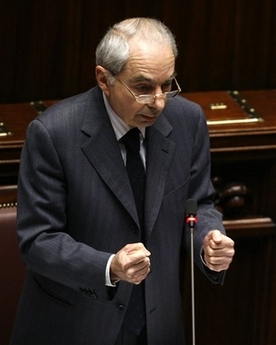Italy resists pressure from soccer clubs
(AP)Updated: 2007-02-07 09:07
Italy's interior minister said he would resist pressure from soccer clubs and
not reopen stadiums to the public until he could ensure safety, days after a
police officer died in rioting at a Serie A match in Sicily.
The rioting Friday at Catania halted all league games last weekend, and officials have threatened to extend the suspension. A decision on when to resume play would be made Wednesday, the Italian soccer federation said.
Play could resume this weekend, reports said, but according to emergency security measures agreed upon by government and soccer officials, many games might be held behind closed doors in stadiums that don't meet security requirements.
Club officials from Serie A and B clubs met Tuesday for informal talks in Rome and said they wanted to resume play this weekend ¡ª with spectators.
"We'd like this closed-doors measure to be eliminated," Palermo President Maurizio Zamparini said after the meeting.
"We want the government to listen to us," Zamparini added. "We will give all the guarantees so that order can be ensured, but we can't play behind closed doors."
Cabinet ministers and soccer officials held an emergency meeting Monday to outline tough measures in response to Friday's violence at an all-Sicilian match between Palermo and Catania. The measures include barring soccer fans from stadiums where security requirements are not met, and barring clubs from selling blocks of tickets to visiting fans to control who enters the stadium.
Cardinal Tarcisio Bertone, the Vatican's No. 2 official, weighed in on the debate, urging the government to do more. "The measures are right but insufficient," he was quoted as saying by news agency ANSA.
The measures will be presented for approval at a Cabinet meeting on Wednesday.
"There's no doubt that from that world (of soccer) pressure will come that the show must go on, that soccer is a big deal," Amato said in an address to the Chamber of Deputies. "We have a duty, before our law enforcement officials and our citizens, to resist these pressures."
Amato's comments appeared to be a response to soccer league president Antonio Matarrese, whose remarks that soccer should not be halted outraged many.
"We are saddened, but the show must go on," Matarrese told an Italian radio station, in comments picked up by La Repubblica on Monday. "Unfortunately, deaths ... are part of this huge movement, which law enforcement officials still can't control."
Matarrese later said he had been misunderstood and had not intended to sound as though he was taking the violence lightly. But on Tuesday, some called for his resignation.
Amato also told lawmakers that 34 people were arrested following the rioting, including 11 minors. None was believed to be responsible for the death of 38-year-old officer Filippo Raciti, but they were suspected of violence against public officials and vandalism.
Among those arrested was a stadium custodian accused of letting violent fans in without tickets, reports said. The custodian's home inside the stadium complex was reportedly full of clubs and anti-police banners.
Amato said that, between the start of the season in the autumn and January, the number of police officers injured at soccer matches rose to 228 from 158 from the same span last year. The number of people arrested rose by almost 20 to 136 in the same span.
The minister said that a package of measures put in place by his predecessor was not properly implemented, and took clubs to task for failing to meet the security requirements. He said stadiums found ways around implementing the regulations.
"We are faced with a clear will to avoid these (requirements)," Amato said.
In Italy, stadiums typically belong to cities and are rented out to clubs, which are often reluctant to invest in security requirements.
According to a report published Monday in Italian sports daily Gazzetta dello Sport, only four stadiums used by Serie A clubs ¡ª in Rome, Turin, Siena and Palermo ¡ª satisfy safety norms. Officials were drawing a list of safe stadiums ahead of Wednesday's meeting.
Milan's San Siro stadium is reportedly not among the group, but AC Milan
vice-president Adriano Galliani expressed confidence that the stadium,
considered one of Europe's finest, would meet all the necessary
requirements.
|
||
|
||
|
|

